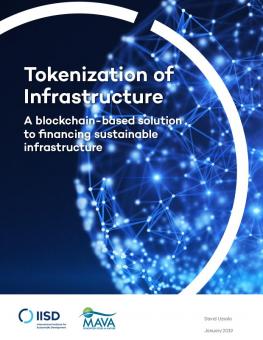
Tokenization of Infrastructure: A blockchain-based solution to financing sustainable infrastructure
This report presents how tokenization can address some of the fundamental challenges of financing sustainable infrastructure projects.
Key Messages
- The main value proposition of tokenizing sustainable infrastructure lies in its potential to decrease the cost of financing.
- Tokenization can also deliver a wide range of financial and operational benefits.
The paper examines how the tokenization of sustainable infrastructure can address some of the fundamental challenges of the asset class. Tokenization is the digitalization of an asset, where each token represents ownership of a part of the underlying infrastructure project. Blockchain enables the storage and transfer of these cryptographic tokens in a frictionless manner.
Tokenization can deliver a wide range of benefits—such as lower transactions costs, better transparency, enhanced liquidity, access to alternative sources of capital, decentralization and increased efficiency—while addressing the issue of scale.
Improving efficiency throughout the financing and operation phases is particularly important for sustainable infrastructure projects. They tend to require a bigger upfront investment (capital expenditure) and have higher perceived technological risks compared to more traditional infrastructure. As a result, there is often a need to explore innovative financing solutions to make sustainable infrastructure financially viable and attractive to investors. Tokenization can play an important role in decreasing the cost of financing, making the whole asset class more bankable.
Tokenizing real assets is still in its early stages; however, as the case studies in this paper demonstrate, there are already several initiatives gaining considerable traction. There are of course challenges, both regulatory and related to technology, that need to be overcome in order to have wider adoption.
Participating experts
You might also be interested in
Sustainable Asset Valuation of Parques del Río Norte in Medellín, Colombia
This economic valuation demonstrates the benefits of expanding urban green space in the city of Medellín, Colombia.
A Sustainable Asset Valuation Assessment of Building and Transport Infrastructure Investment in the Shymkent-Tashkent-Khujand Economic Corridor
This report presents the Sustainable Asset Valuation (SAVi) of a proposed transport and building infrastructure development on the border of Kazakhstan and Uzbekistan to promote close and mutually beneficial trade relationships between the countries.
We need more natural infrastructure, and fast
While natural infrastructure alone could not have prevented the Red River spill, a well-funded hybrid system of grey and natural infrastructure will help mitigate the impacts of such disasters, and help prevent them happening again in the future, as well as support the Canadian environment, and the economy.
Financing Transport Projects: Why integrating externalities matters for decision making
This briefing paper analyzes the importance of integrating externalities into financial analysis to improve decision making for infrastructure transport projects.